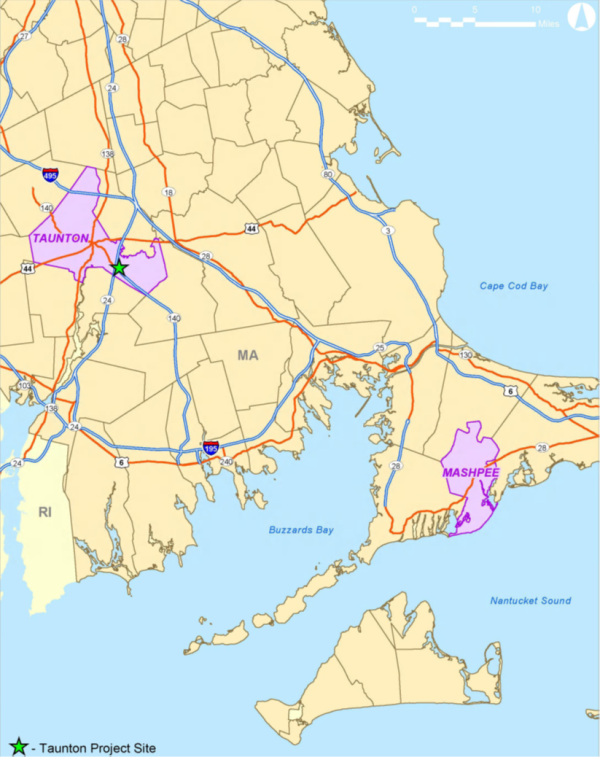Related Content
Press Release
Earlier this month, the U.S. Supreme Court denied a petition for certiorari seeking review of lower court rulings that upheld a 2021 Department of the Interior decision to acquire land in trust for the Mashpee Wampanoag Tribe.
The denial of certiorari allows the Department of the Interior to continue to hold land in trust for the Tribe, ending eight years of protracted litigation over the question of Interior’s authority under the Indian Reorganization Act of 1934 (IRA) to acquire the property. The property, which totals approximately 321 acres, encompasses lands within Mashpee, Massachusetts, where the Tribe’s government is headquartered, as well as lands within Taunton, Massachusetts, where the Tribe intends to engage in economic development to generate revenue for its community. These lands are situated within the ancestral territory of the Tribe’s predecessor, the Wampanoag Nation.


“After eight years of litigation, the Mashpee Wampanoag Tribe will finally be able to use more than 300 acres of land in the Cape Cod and southeastern Massachusetts area for development and benefit of the Tribe,” said Acting Associate Attorney General Benjamin C. Mizer. “This development will right a historical wrong and is an example of the Justice Department’s steadfast commitment to upholding the rights of Tribes.”
“Now that the Supreme Court has denied certiorari in the case, the Mashpee Wampanoag Tribe can be confident that its trust lands in southeastern Massachusetts – lands it has occupied since time immemorial – are secure in perpetuity,” said Assistant Attorney General Todd Kim of the Justice Department’s Environment and Natural Resources Division (ENRD). “The acquisition of these lands in trust helps to address the historical wrongs the Tribe has endured and ensures that the Tribe can pursue all opportunities to engage in self-government and economic development, fulfilling the goals of the Indian Reorganization Act.”
“With this decision, leaders of the Mashpee Wampanoag Tribe are finally able to implement plans to meet the needs of their citizens after years of hard work in partnership with our team," said Solicitor of the Interior Department Bob Anderson. “The Department of the Interior remains steadfastly committed to respecting Tribal sovereignty, strengthening self-governance and fulfilling federal trust and treaty responsibilities.”
In 2015, Interior first issued a decision approving the Mashpee Wampanoag Tribe’s request to acquire the property and hold it in trust for the Tribe’s benefit. A group of residents who live in Taunton challenged this decision in the U.S. District Court for the District of Massachusetts, which remanded the matter back to Interior to reconsider its decision, including to evaluate whether the Tribe was “under Federal jurisdiction” in 1934, as required by Carcieri v. Salazar, 555 U.S. 379 (2009). In 2018, Interior issued a decision concluding it lacked authority to hold land in trust for the Tribe because the Tribe was not “under Federal jurisdiction” when Congress enacted the IRA. The Tribe successfully challenged the 2018 decision in the U.S. District Court for the District of Columbia. In 2020, that court concluded that Interior misapplied governing precedents, including its own guidance, and vacated and remanded the 2018 decision back to Interior.
In 2021, Interior issued a third and final decision concluding – consistent with the U.S. District Court for the District of Columbia’s 2020 remand, Interior guidance and other governing precedents – that the Tribe was “under Federal jurisdiction” in 1934. Based on this conclusion, Interior affirmed its original 2015 decision to accept the property in trust.
The plaintiffs filed a new lawsuit challenging the 2021 decision in the U.S. District Court for the District of Massachusetts. The district court rejected the group’s challenge and concluded that Interior’s determination was reasonable and supported by the agency’s administrative record, and that applicable Interior guidance properly interpreted the IRA. Among other things, the court found that evidence of attendance of Mashpee children at the infamous Carlisle Indian School, in which the children were subjected to an array of federal assimilationist policies, was “overwhelming” evidence of federal jurisdiction. On appeal, the First Circuit Court of Appeals affirmed the district court, concluding that Interior’s 2021 decision was reasonable, supported by the administrative record and consistent with governing law.
Trial attorneys Rebecca M. Ross, Marisa J. Hazell and Charmayne G. Staloff of ENRD’s Indian Resources Section defended Interior’s 2021 decision in the district court, and attorneys Christopher Anderson and Mary Gabrielle Sprague of ENRD’s Appellate Section defended the decision in the First Circuit Court of Appeals.